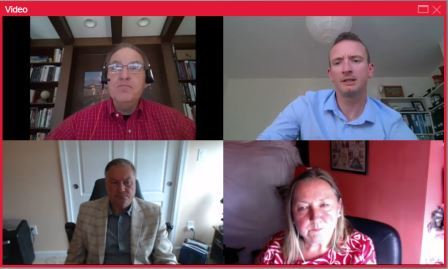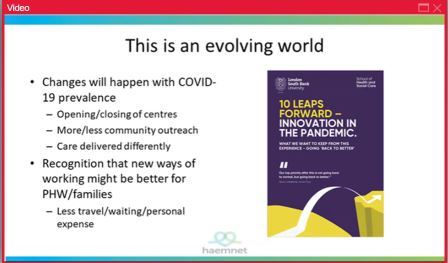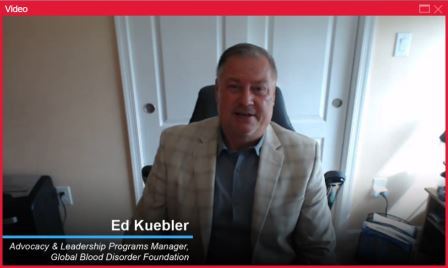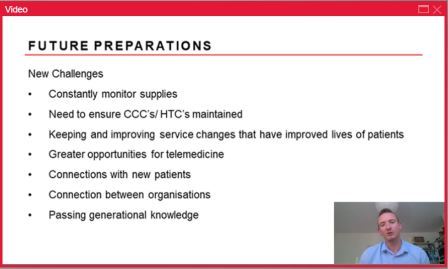Moderator: Declan Noone, President, European Haemophilia Consortium
The impact of COVID-19 on the global bleeding disorders community was a key session in the WFH Virtual Summit. Jaime Chase and Nicoletta Crollini give their perspectives on the nursing and psychosocial issues raised.

Please liaise with your Haemophilia Treatment Center (HTC) team about the best way for you to communicate with the team during the COVID-19 pandemic as local circumstances may vary.
JAIME CHASE
Haematology Clinical Nurse Specialist, John Hunter Children’s Hospital, Newcastle NSW
Kate Khair, Director of Research, Haemnet

A session that was particularly informative during the summit was Emerging from COVID – a new normal. A number of informative and passionate professionals spoke about how the person with haemophilia may be experiencing healthcare in the pandemic and how their care might change during this challenging time.
It was particularly thought-provoking to hear Kate Khair speak about how healthcare has evolved and will continue to change as the pandemic progresses.
Kate explained that haemophilia care will continue to change and evolve just as COVID-19 changes. Your Haemophilia Treatment Centre (HTC)’s care of you and your haemophilia may have or will change during this time.
The changing face of haemophilia care in the COVID-19 era has been particularly challenging, not only for the person with haemophilia but also for the Haemophilia Treatment Team itself. Teams have been moved perhaps from the HTC to other areas of the hospital and in some cases they may be working from home. Staff may be ‘surged’ to other areas, which is a term used when staff are required to relieve other staff for short periods due to the hospital’s acuity or the intensity of nursing required in particular areas. A great example of this is when staff are ‘surged’ to help manage queues in COVID testing areas or at screening stations at designated entrances to hospitals.
The important thing to remember in this ever-changing situation is that the expertise of all the multidisciplinary team is there to help you. Instead of being physically always available, remember they are on the other side of a telephone call to offer their expert advice and recommendations. As the pandemic progresses your clinic appointments will likely move to telehealth. If you have not experienced this as yet, a link is sent to your email address that you utilise to be able to have a virtual clinic with your healthcare professional from your own home. Your HTC may be utilising this option or using a telephone call to review you. If you are having issues with the technical aspects of this option, please talk with your HTC who will be able to offer support and advice.
Kate also discussed what to do in case of a bleed. Your HTC is always there for advice and you may still be asked to present for treatment and review. It may be somewhere different to where you are used to and it may be with different staff. There will be extra precautions taken by staff (such as wearing masks and frequent cleaning) and there may be limits on how many support people you can have with you. Importantly, it was stressed that a bleed needs to be treated and reviewed as necessary. Hospitals are safe places for people to come to and be treated; they should never be feared when treatment is required.
Kate also discussed prophylaxis, and how as restrictions ease or increase in your state or region, you will need to be mindful of your activity levels and discuss with your HTC as required. In regards to surgery, some waitlist or pre-booked elective surgeries may be delayed. Acute surgery will proceed and it is imperative that your treating [surgical?] team has a treatment plan from your HTC and that you are aware that your follow-up may vary as you move from inpatient to outpatient. Follow-up may be conducted via telehealth rather than face-to-face.
In conclusion, it can be noted that the ‘new normal’ is an ever-evolving world. Care is delivered differently and as COVID-19 continues, the way that healthcare is delivered may change for the better. There has been a gradual recognition that the new ways of caring for people with haemophilia and their families might be better in the long run. There is less travel, waiting and personal expense noted with this model of care. Your HTC is always there to offer support, expert advice and education to people with haemophilia and their families.
I would encourage everyone to access the Virtual Summit and enjoy the presentations and posters. The educational and supportive content is comprehensive and accessible for all. If you have any questions regarding the presentations, please contact your HTC for further advice. Stay safe and remember to follow health care advice. Your HTC is there when you need them.
NICOLETTA CROLLINI
Haemophilia Social Worker, Royal Prince Alfred Hospital, Sydney
Dr Len Valentino, Chief Executive Officer, National Hemophilia Foundation
The session on COVID-19 was highly informative and useful. It commenced with Dr Len Valentino providing tips on staying safe, with the main point being to stay informed and keep up-to-date with local recommendations. Dr Valentino's advice couldn't be any more relevant at present, considering the varying impacts of COVID-19 throughout Australia.
Ed Kuebler, Advocacy and Leadership Programs Manager, Global Blood Disorder Foundation

Following on from Kate Khair, Ed Kuebler discussed the psychosocial implications of COVID-19. Ed noted that people might experience post-traumatic stress disorder (PTSD) as a result of COVID-19, due to high levels of stress experienced during this time as well as the many other ways COVID-19 has impacted individuals. PTSD is the frightening feeling of past experiences of fear, even when one is not in danger. Ed discussed what it would take to 'be ok' and explained this is a state of mind that comes from ourselves through being present and in the moment. He recommended taking a moment for yourself to define what 'being ok' means to you. When exploring your 'ok', consider your past 'ok'. Are you comparing your ‘ok’ to the 'ok' of people around you? Is your 'ok' the ideal definition of normal? At which point is that an unachievable 'ok'? This exercise will hopefully provide you with clarity about what 'being ok' genuinely means to you.
Ed went on to discuss managing losses related to COVID-19. These could be losses of employment, socialising, travel and the many other losses we have all experienced as a result of COVID-19. He recommended reflecting on your experience of loss and drawing upon your experiences of resilience or your ability to bounce back from challenging situations. Time and compassion are essential when dealing with loss, so be gentle to yourself.
Ed explored the struggles that some might be experiencing in trying to define their 'new normal' as a result of COVID-19. He suggested our ‘new’ normal should be informed by the relevant COVID-19 information available to us and that it is important to acknowledge the struggle we are experiencing in defining our ‘new’ normal is more psychological.
He recognised that many people would have very much liked their life before COVID-19, but recommended you unload these feelings and thoughts through the exploration of your new way of life. How does one go about doing this? He suggested writing a list of what you liked before and how they are different now. Don't be afraid to acknowledge those changes or losses and stay in the moment by being present with what is around you. He recommended defining your ‘new normal’ from a place of positivity: ‘you have the power to define this’.
Ed's final comment, which I found to be quite powerful, was to stop resisting and fighting as it will allow you to move forward. Remind yourself, ‘it is what it is.’ This is a powerful statement of moving forward, accepting your ‘new normal’, which includes the changes and aids in releasing our internal struggles.
Declan Noone, President, European Haemophilia Consortium

Declan Noone ended the session discussing patient concerns and positive outcomes during COVID-19.
Firstly, Declan explained that technically people with an inherited bleeding disorder are not at an increased risk of contracting COVID-19 than the general population. However, those receiving treatments such as immunosuppressants or steroid treatments as well as individuals who might have other health issues such as pre-existing lung problems are at an increased risk of serious illness from COVID-19.
Declan observed there had been positive outcomes of COVID-19 for haemophilia and rare bleeding disorder treatments: robust treatment supply chains, increased access to home treatments, increased access to treatment home delivery, the rapid roll-out of telehealth medicine, the ability to respond to crisis rapidly, the pharmaceutical industry promptly providing supportive information as well as new methods of engaging with each other, such as the World Federation of Haemophilia Virtual Summit.
Declan ended his discussion by exploring the new challenges ahead and future preparation required. This involves continuous monitoring of supplies to ensure shortages do not occur, and he advised that people with bleeding disorders continue to maintain contact with your HTC and explore the new models of healthcare available such as telehealth.
I found this session to be very helpful and informative. It certainly provided me with clarity and the ability to take a moment to reflect on everything that has occurred as a result of COVID-19. The session left me feeling informed and more than anything provided me with the ability to feel a little more settled, during such an uncertain and unsettling time. I hope you find this summary provides you with these feelings too.
A final reminder, your HTC is here for you, and you can still contact us to talk through any concerns, just like always. Stay safe and take care!
Haemophilia Foundation Australia acknowledges the Traditional Owners and Custodians of Country throughout Australia, the land, waters and community where we walk, live, meet and work. We pay our respects to Elders past and present and extend that respect to all Aboriginal and Torres Strait Islander peoples.
Sign up for the latest news, events and our free National Haemophilia magazine